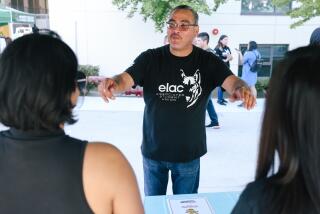The Chinese student who petitioned Stanford to fight coronavirus with online classes
- Share via
Stanford University senior Yulou Zhou doesn’t know if his actions helped influence the campus decision on Friday to move all classes online amid the spread of coronavirus in the Bay Area. But he knows he became alarmed about the virus well before most of his classmates at the elite Palo Alto campus.
That’s because his hometown of Yueyang is an hour’s train ride from Wuhan in central China, the epicenter of the novel coronavirus outbreak. As cases spread to Yueyang, Zhou’s fears escalated. By mid-January, he was sending face masks to his family. He told his grandparents to stay home. He checked in with his parents daily to make sure they had enough food. Posts from Wuhan pleading for medical help filled his social media.
His early anxieties sharply contrasted with what Zhou said he saw at Stanford. Other Stanford students seemed to feel likewise in robust discussions on Chinese-language social media platforms, he said. On Tuesday, Zhou and more than two dozen other students launched a petition calling Stanford’s efforts against the virus “deficient at best” and demanded that administrators encourage online learning, lift attendance requirements for larger classes and adopt stronger protective measures. Nearly 3,700 signed.
Three days later, Stanford became the first California university to announce it would cancel all in-person classes for its 16,500 students beginning Monday for the remaining two weeks of the quarter. Stanford also announced it would cancel its annual weekend visit for admitted students in April and all group campus tours and information sessions.
The Friday night announcement, the most sweeping of several earlier Stanford actions, came after a faculty member tested positive for COVID-19, and two students were in self-isolation after possible exposure to the virus.
“We recognize that this is a significant adjustment for many instructors,” Provost Persis Drell said in a letter to the campus community. But she said the actions were needed “both to help reduce the spread of COVID-19 and to ease anxiety in our community as winter finals approach.”
Officials at Stanford could not be reached for comment Saturday. But Zhou said he is grateful for the actions and for those who signed the petition.
“Students who have been following outbreaks in other countries started to realize how dangerous this was,” said Zhou, 22, who is majoring in linguistics and computer science. “So I’m really, really relieved.”
As COVID-19 spreads, other school districts and universities are stepping up protective measures. The University of Washington and several other schools in the Seattle area have canceled in-person classes. San Jose State University is “strongly considering” taking similar actions amid 32 confirmed cases of COVID-19 in Santa Clara County, according to a university statement Saturday.
UC Davis and Santa Clara University said on their websites Saturday that they plan to continue with in-person classes but are preparing for the possibility of disruptions at a moment’s notice, advising their community to watch for announcements.
USC announced it would move all classes online for three days beginning Wednesday to test whether it can operate remotely should the university decide to suspend face-to-face contacts.
On Saturday, Elk Grove Unified School District, the largest system in Northern California, announced it would close all schools after a family whose child attends one of its schools was under a quarantine order by the Sacramento County Public Health Department. No students or staff member has tested positive for COVID-19, a letter to parents said.
With 67 schools and about 64,000 students, Elk Grove is the first school district in the state to shut down, upending the lives of thousands of families. A big basketball playoff game and the prom were canceled this weekend.
Christopher Hoffman, Elk Grove superintendent, said during a live-streamed briefing Saturday that the decision to close may not be “the right thing for every district, but I do think it’s the right thing for us at this particular point in time.” The week off will be the district’s April spring break, so class time won’t be lost, he said. The move “allows us to take a breath and figure out what is the correct step moving forward.”
Following the Elk Grove announcement, Sacramento County education and public health officials issued a statement to assure local school districts that to date, there are no diagnosed COVID-19 cases involving students or school staff in the county. They said they respect the Elk Grove decision to move up their spring break and will work with them to “fully understand their situation.” Officials said there is no immediate risk or recommendation “that any individual school or school district needs to close” in Sacramento County.
At Stanford, the move to online classes drew varied reactions. Some students welcomed the decision, while others said it created uncertainties.
Cedrick Argueta, a 21-year-old senior majoring in computer science, questioned how the move to remote learning would work for his Filipino-language course. He said the class heavily relies on group work but the online technology platform planned for use is more suited to lectures than person-to-person interactions. He said the prohibition of in-person classes also would affect his final group project since his team members are in Palo Alto and he’s still in Los Angeles and may not return to campus.
Other students are wondering how they can complete their lab classes remotely or whether essential courses could be canceled for spring quarter and jeopardize their graduation.
“That would be a mess,” said Brian Contreras, 20, a senior majoring in science, technology and society.
Contreras said students like him with internships or jobs lined up would not be able to make up any canceled classes in the summer or fall. Other students had planned to study abroad next quarter, but Stanford shut those down. His spring break trip to Austin, Texas, is now up in the air after Stanford discouraged even domestic travel.
He said feelings among students about the measures are mixed. “There are plenty of people who think it’s silly to cancel classes,” he said.
Erin Woo, a junior majoring in communications, said she is not particularly concerned about her own safety because the virus is less dangerous to healthy young adults like her. The new campus measures could help protect older faculty and staff members, she said, or those with compromised immune systems.
But Olivia Manes, a sophomore in international relations and comparative literature, strongly supports the Stanford decision and already is making plans to head home to Cathedral City to finish up the quarter online.
“There’s been a lot of anxiety about going to class and taking finals in a crowded room,” Manes said. “A lot of people are getting off campus as soon as they can. It feels like the longer you stay here, the longer you’ll be exposed to coronavirus.”
She said the threat of the novel coronavirus has spiked anxieties and upended routines across campus. She now avoids dining halls.
Parties and social events have been canceled, as have many campus events after Stanford advised postponing or canceling gatherings of more than 150 people. On Thursday, Santa Clara County public health officials also advised residents against attending large gatherings and to minimize work in large groups.
“It’s made me a lot more paranoid,” Manes said. “You don’t know if the person next to you has a cold or coronavirus.”
More to Read
Sign up for Essential California
The most important California stories and recommendations in your inbox every morning.
You may occasionally receive promotional content from the Los Angeles Times.











